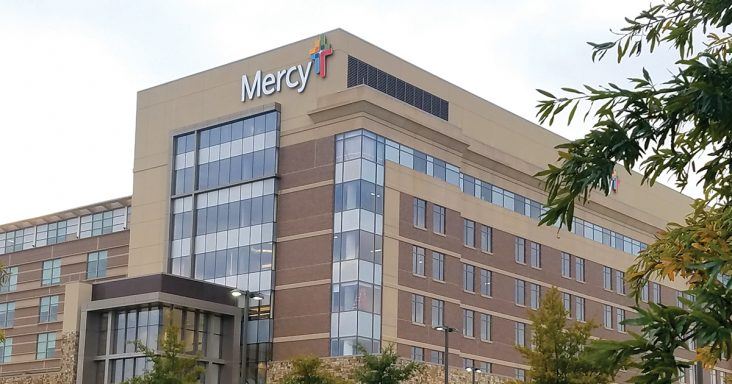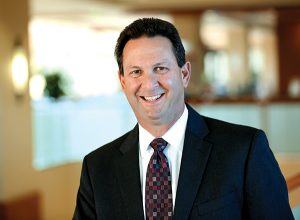Mercy set to open $133 million hospital expansion in Rogers
by November 10, 2019 4:05 pm 3,372 views

It’s been more than four years in the making, but Mercy Hospital Northwest Arkansas in Rogers is set to unveil its new seven-story patient tower and health services expansion on Monday (Nov. 11). The 190,000-square-foot expansion cost $133 million. That’s roughly $15 million over budget and some 90 days behind schedule, due largely to some additional changes and additions to the original plan.
Eric Pianalto, president of Mercy Hospital Northwest Arkansas in Rogers, said the overall buildout went smoothly. While the top two floors are not built out and will be expanded later, the hospital’s neonatal unit has doubled in size to 19 beds with a 24/7 Intensive Care Unit (ICU) for premature babies. There are 150 additional patient beds with the expansion, as well as more cardiac and general operating rooms.
The hospital will have a new entrance with a glass lantern look and prominent crosses that represent Mercy’s heritage, which dates back to 1827 and the Sisters of Mercy of Dublin, Ireland. Pianalto said the mission started by Mercy’s founders is still very much a part of operations.
Mercy Northwest Arkansas is an affiliate of St. Louis-based health system Mercy.
“As a Catholic healthcare facility, our mission is to treat and educate regardless of ability to pay,” Pianalto said.
The hospital group spent more than 18 months researching the demand needs and looking at the gaps in care throughout the region before it unveiled the $247 million expansion plan in April 2016. The investment was expanded to $277 million and included a multispecialty clinic in Springdale and four additional primary care clinics in Bentonville, Centerton and Pea Ridge. Pianalto said over the five-year plan, which runs through 2020, Mercy will add 1,000 jobs. To date, roughly 900 of those jobs have been filled. He said the balance will be added as the hospital ramps up over the next year or so as demand dictates. He said the massive expansion was planned to address demand out five more years.
He said Mercy has gone back to the table and begun to talk and research what comes next. The community, which raised $20 million for the first phase of expansion, will also be asked to raise another $20 million for the second phase once that is announced. He said there is auxiliary space in the new tower to expand diagnostics, surgical and women’s services, which are all housed in the new building.
ACA INSIGHTS
Pianalto said Mercy’s decision to expand was not predicated on the Affordable Care Act (ACA) but had more to do with the explosive population growth in the region and achieving critical mass to sustain the investment. He said Mercy took the ACA demand into account in the original plans. When asked what Mercy has learned since the ACA was mandated in 2014, Pianalto said that during the first year to 18 months, between 3% and 4% of patients who had been charity cases became insured at some level.

“We found a rise in the number of emergency room visits during the first year or so because the newly insured sought care there for non-acute issues,” he said. “It took some time to educate those patients to use our primary care clinics and convenient care facilities when appropriate. We added several of these clinics around the region during that time and started steering patients there.”
Pianalto said with the ACA and rising costs, employers also began shifting more of the financial burden of health insurance to employees. He said the number of patients carrying high deductibles of $5,000 to $10,000 remains high today. He said working with patients who have high deductibles has become commonplace in recent years. While Mercy treats people who can’t pay through its charity arm for non-elective procedures, there are elective procedures that don’t get done. He agreed as more people have become insured, the number of underinsured has also risen.
He said Mercy has geared up to be a regional hospital, drawing in patients from six surrounding counties with the recent expansion. With more rural hospitals around the country closing, Pianalto said Mercy sought to work on its excellence ratings and bridged relationships with rural hospitals to facilitate emergency transport when necessary. Pianalto said Mercy Rogers could not address those needs six years ago. Now, he said the distance of the patients Mercy Rogers treats expands almost monthly.
HEALTHCARE DESTINATION
Mercy is also taking an active role in helping Northwest Arkansas become a healthcare destination. Pianalto said aside from working closely with the Northwest Arkansas Council and other health providers in the region, there are several areas where Mercy can offer insights. He said working to become a top 100 hospital, expanding residency plans and specialty areas such as neonatal, cardiac and wound care are all steps in the right direction.
Pianalto said Mercy also has seen success with its virtual health program, which has about 250 patients locally. He said these patients benefit from virtual monitoring through an iPad that the hospital provides. These are typically patients with Chronic Obstructive Pulmonary Disease (COPD), congestive heart failure or diabetes.
He said the program is administered out of Mercy in St. Louis, and there are local liaisons who meet and interact with patients and family members. The patient has a FaceTime check-in with a health professional several times a week, and their health is assessed regularly from their homes. He said scales are used to detect water weight gain in congestive heart patients, while another technology is used to help with diabetic blood testing.
“We have seen health costs reduced by 35% by those in this program,” Pianalto said. “The outcomes are better, and these patients spend far less time in the hospital. We will continue to try and advocate for this type of care for some patients and hope the industry will figure out how to compensate for outcomes. Right now, there is no funding to pay for this care that can reduce costs by 35%.”
He said part of the work Mercy will take on in the next five years will be on payment reform, applying technology to improve health status and reducing the cost burden.
“Healthcare will always need a human touch, but there is no reason we can’t use technology to drive costs down and improve outcomes,” he said.
